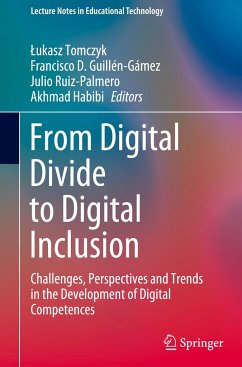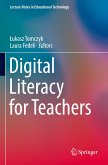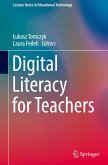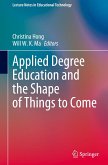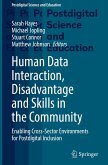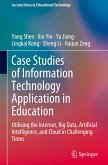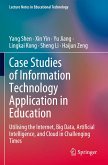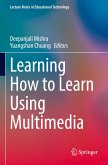From Digital Divide to Digital Inclusion
Challenges, Perspectives and Trends in the Development of Digital Competences
Herausgegeben:Tomczyk, Lukasz; Guillén-Gámez, Francisco D.; Ruiz-Palmero, Julio; Habibi, Akhmad
From Digital Divide to Digital Inclusion
Challenges, Perspectives and Trends in the Development of Digital Competences
Herausgegeben:Tomczyk, Lukasz; Guillén-Gámez, Francisco D.; Ruiz-Palmero, Julio; Habibi, Akhmad
- Gebundenes Buch
- Merkliste
- Auf die Merkliste
- Bewerten Bewerten
- Teilen
- Produkt teilen
- Produkterinnerung
- Produkterinnerung
This book offers an expert perspective on two key phenomena in the development of the information society, namely digital inclusion and digital exclusion. Despite the intensive digitalization of various areas in human activity, the lack of proper information and communications technology (ICT) literacy, the lack of access to high-speed Internet, and the still unsatisfactory level of e-services are a reality in many regions and countries. This edited book presents a unique overview of research related to the dynamics of digital exclusion and the development of digital competences, as well as an…mehr
Andere Kunden interessierten sich auch für
![Digital Literacy for Teachers Digital Literacy for Teachers]() Digital Literacy for Teachers139,99 €
Digital Literacy for Teachers139,99 €![Digital Literacy for Teachers Digital Literacy for Teachers]() Digital Literacy for Teachers140,99 €
Digital Literacy for Teachers140,99 €![Applied Degree Education and the Shape of Things to Come Applied Degree Education and the Shape of Things to Come]() Applied Degree Education and the Shape of Things to Come108,99 €
Applied Degree Education and the Shape of Things to Come108,99 €![Human Data Interaction, Disadvantage and Skills in the Community Human Data Interaction, Disadvantage and Skills in the Community]() Human Data Interaction, Disadvantage and Skills in the Community108,99 €
Human Data Interaction, Disadvantage and Skills in the Community108,99 €![Case Studies of Information Technology Application in Education Case Studies of Information Technology Application in Education]() Yang ShenCase Studies of Information Technology Application in Education108,99 €
Yang ShenCase Studies of Information Technology Application in Education108,99 €![Case Studies of Information Technology Application in Education Case Studies of Information Technology Application in Education]() Yang ShenCase Studies of Information Technology Application in Education108,99 €
Yang ShenCase Studies of Information Technology Application in Education108,99 €![Learning How to Learn Using Multimedia Learning How to Learn Using Multimedia]() Learning How to Learn Using Multimedia108,99 €
Learning How to Learn Using Multimedia108,99 €-
-
-
This book offers an expert perspective on two key phenomena in the development of the information society, namely digital inclusion and digital exclusion. Despite the intensive digitalization of various areas in human activity, the lack of proper information and communications technology (ICT) literacy, the lack of access to high-speed Internet, and the still unsatisfactory level of e-services are a reality in many regions and countries. This edited book presents a unique overview of research related to the dynamics of digital exclusion and the development of digital competences, as well as an analysis of the most effective educational solutions to foster the digital inclusion of disadvantaged groups.
This book is particularly useful for educators dealing with the topic of digital exclusion and inclusion and who are looking for knowledge on enhancing digital competences in disadvantaged groups. It is also helpful for social policy makers involved in designingsolutions to minimize various forms of digital exclusion. Finally, this book serves as a reference for academics and students from the disciplines of pedagogy, social policy, new media psychology, media sociology, and cultural anthropology.
This book is particularly useful for educators dealing with the topic of digital exclusion and inclusion and who are looking for knowledge on enhancing digital competences in disadvantaged groups. It is also helpful for social policy makers involved in designingsolutions to minimize various forms of digital exclusion. Finally, this book serves as a reference for academics and students from the disciplines of pedagogy, social policy, new media psychology, media sociology, and cultural anthropology.
Produktdetails
- Produktdetails
- Lecture Notes in Educational Technology
- Verlag: Springer / Springer Nature Singapore / Springer, Berlin
- Artikelnr. des Verlages: 978-981-99-7644-7
- 1st edition 2023
- Seitenzahl: 580
- Erscheinungstermin: 5. Februar 2024
- Englisch
- Abmessung: 241mm x 160mm x 37mm
- Gewicht: 1027g
- ISBN-13: 9789819976447
- ISBN-10: 9819976448
- Artikelnr.: 69012395
- Herstellerkennzeichnung Die Herstellerinformationen sind derzeit nicht verfügbar.
- Lecture Notes in Educational Technology
- Verlag: Springer / Springer Nature Singapore / Springer, Berlin
- Artikelnr. des Verlages: 978-981-99-7644-7
- 1st edition 2023
- Seitenzahl: 580
- Erscheinungstermin: 5. Februar 2024
- Englisch
- Abmessung: 241mm x 160mm x 37mm
- Gewicht: 1027g
- ISBN-13: 9789819976447
- ISBN-10: 9819976448
- Artikelnr.: 69012395
- Herstellerkennzeichnung Die Herstellerinformationen sind derzeit nicht verfügbar.
¿ukasz Tomczyk, Associate Professor at the Institute of Pedagogy, Jagiellonian University, Poland. He received his doctorate in philosophy (PhDr) from Charles University in Prague, Czech Republic, and his doctorate in pedagogy (media education, social pedagogy) from the Pedagogical University in Krakow. He is a computer science engineer, author of 7 monographs and over 200 scientific articles, and editor of 13 collective monographs. He is researcher and manager in several international projects financed from sources: NCBiR, NCN, Erasmus+, NAWA, Visegrad Fund, and Mundus Penta. He has taught students in the Czech Republic, Slovakia, Macedonia, Bosnia and Herzegovina, Serbia, Germany, Croatia, Brazil, Uruguay, Dominican Republic, Italy and Indonesia. His research interests are in media and information education, information society and lifelong learning. ¿ukasz is also a reviewer of textbooks at the Ministry of Education, Fellow of the Ministry of Science and Higher Education (outstanding young researchers), and Member of the research network: EU KIDS Online and COST Action CA16207 European Network for Problematic Usage of the Internet. He is Associate Editor in the journal Education and Information Technologies (Springer, IF=5.5), and also works as a reviewer for a number of foreign research agencies, including the European Commission. He has currently completed an 18-month research study on digital competences of teachers of the future at the Italian University of Macerata, funded by a Mieczyslaw Bekker scholarship (National Agency for Academic Exchange). Francisco D. Guillén-Gámez, Ph.D., is a professor at the Faculty of Education of the University of Málaga, Spain. Among his academic studies, some highlights are: Primary Education Teacher, Master in New Technologies in Education, Master in Research in Education, and Master in Methodology in Behavioral and Health Sciences. His research interest concerns educational technology, teaching digital competence, and quantitative research designs. He is the author of more than 40 articles positioned in impact journals JCR (Journal Citation Reports) and SJR (Scientific Journal Rankings). He is a deputy director of Innoeduca Journal (International Journal of Technology and Educational Innovation). Julio Ruiz-Palmero holds a Doctorate in Educational Technology from the University of Málaga, Spain, a Master's in New Technologies Applied to Education, a Bachelor's in Virtual Environments for Training, and a Degree in Mathematics. His research interests are educational innovation, e-learning, and new technologies applied to education. He collaborates as an evaluator in different national agencies such as the National Agency for Quality Assessment and Accreditation (ANECA), the National Agency for Evaluation and Foresight (ANEP), the Agency for the Quality of the University System of Castilla y León (ACSUCYL) and the Valencian Agency for Evaluation and Foresight (AVAP). He is editor of the Innoeduca Journal -International Journal of Technology and Educational Innovation- and has been directing the Innoeduca Research Group -SEJ533- at the University of Malaga for years, with the commitment to investigate teaching-learning processes with technology. He has coordinated and participated in innovation and research projects in Spain and the European Union (R+D+I, Tempus, AECID and AECID). As a result of these projects, he has published numerous works in prestigious national and international publishing houses, as well as in JCR and SCOPUS impact journals. Akhmad Habibi Assoc. Prof. earned his doctoral degree at the University of Malaya, Malaysia. Focusing on educational technology and statistics, he has published his work in 102 refereed journals (indexed by Scopus), 56 indexed by Web of Science, authored 4 books, and co-edited 1 book chapter by Springer (Lecture Notes in Educational Technology). He also acted as a regular reviewer for journals such as Computers and Education, International Journal of Educational Development, Education and Information Technologies, Research, and International Journal of Science Education. In 2022, he was awarded the title of the best researcher by the institution he worked for, Universitas Jambi (Indonesia), and delivered more than 20 keynote presentations. Besides, he contributed as an editorial board member of 3 international journals. Habibi is the founder of the Asian Journal of Structural Equation Modeling. He is also an invited member of the research board of the Qatar National Research Fund (QNRF). Working and collaborating with researchers from the University of Malaya, the University of Malaga, Al-Ahliya Amman University, Universiti Teknologi MARA, Universitas Terbuka, the Northern University of Malaysia, Jazan University of Saudi Arabia, Beijing Normal University, and Uniwersytet Jagiellöski in Poland, Habibi has been awarded funding for numerous research and publication projects at national and international levels.
Digital inclusion process and perspective in Albania: A Review.- Digital Inclusion and Digital Divide: The Context of Bosnia and Herzegovina.- The idiosyncrasies of digital divide in Brazil: a literature review on initiatives of digital inclusion.- Bridging the digital divide in higher education: Notes from the emergence of the Covid-19 pandemic.- Literacy and professional training - a factor for overcoming the digital divide: experts' opinion.- e-inclusion in Chile.- Digital Inclusion and Exclusion of Basic Education in China: A Systematic Review.- Digital Inclusion and Digital Divide in Colombia.- Digital Transformation Training and Digital Inclusion in Costa Rica.- Reducing digital exclusion in formal and non-formal education in the Czech Republic.- Digital Divide and Digital Inclusion: discussing issues in Greece.- An SLR on digital inclusion: Indonesian perspectives.- Is digitalisation for everybody? Perspectives and obstacles to digital inclusion in Lithuania.- Digital inclusion in Malaysia.- Addressing the digital divide with educational systems in Mexico: challenges and opportunities.- Digital inclusion in the Moroccan context: A review of research and educational initiatives in the 21st century.- Digital Inclusion and Digital Competence in Panamá.- Literacy and digital inclusion for the 21st century. The case of Peru.- Digital exclusion and inclusion in Poland - a systematic review of research and educational activities from two decades.- Digitization in Portugal: a systematic review of technological exclusion and inclusion since the beginning of the 21st century.- From Digital Exclusion to Digital Inclusion: How is the Dominican Republic fostering a Digital Culture?.- Romania 2020-2022: educational policies and strategic options for digital inclusion.- Overview of digital exclusion and inclusion in the Slovak Republic conditions from the 2000 till nowadays.- Review and prospects of digital inclusion in Slovenia.- Analysing the digital inclusion in Spain/Colombia from a systematic literature review.- Digital divide and opportunities for educational inclusion in the Tunez context. A systematic review.- Information literacy and digital inclusion: analysis of the modern information space of Ukraine.
Digital inclusion process and perspective in Albania: A Review.- Digital Inclusion and Digital Divide: The Context of Bosnia and Herzegovina.- The idiosyncrasies of digital divide in Brazil: a literature review on initiatives of digital inclusion.- Bridging the digital divide in higher education: Notes from the emergence of the Covid-19 pandemic.- Literacy and professional training - a factor for overcoming the digital divide: experts' opinion.- e-inclusion in Chile.- Digital Inclusion and Exclusion of Basic Education in China: A Systematic Review.- Digital Inclusion and Digital Divide in Colombia.- Digital Transformation Training and Digital Inclusion in Costa Rica.- Reducing digital exclusion in formal and non-formal education in the Czech Republic.- Digital Divide and Digital Inclusion: discussing issues in Greece.- An SLR on digital inclusion: Indonesian perspectives.- Is digitalisation for everybody? Perspectives and obstacles to digital inclusion in Lithuania.- Digital inclusion in Malaysia.- Addressing the digital divide with educational systems in Mexico: challenges and opportunities.- Digital inclusion in the Moroccan context: A review of research and educational initiatives in the 21st century.- Digital Inclusion and Digital Competence in Panamá.- Literacy and digital inclusion for the 21st century. The case of Peru.- Digital exclusion and inclusion in Poland - a systematic review of research and educational activities from two decades.- Digitization in Portugal: a systematic review of technological exclusion and inclusion since the beginning of the 21st century.- From Digital Exclusion to Digital Inclusion: How is the Dominican Republic fostering a Digital Culture?.- Romania 2020-2022: educational policies and strategic options for digital inclusion.- Overview of digital exclusion and inclusion in the Slovak Republic conditions from the 2000 till nowadays.- Review and prospects of digital inclusion in Slovenia.- Analysing the digital inclusion in Spain/Colombia from a systematic literature review.- Digital divide and opportunities for educational inclusion in the Tunez context. A systematic review.- Information literacy and digital inclusion: analysis of the modern information space of Ukraine.

